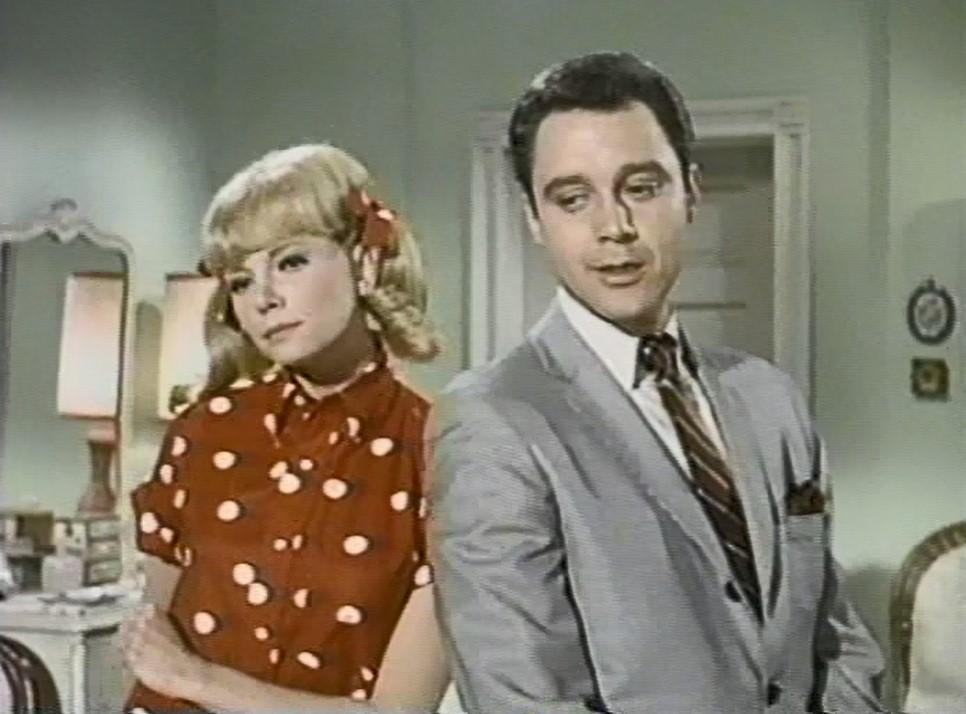
Today, we look at the bizarre 1960s sitcom with a shockingly outdated conceit, Occasional Wife.
In Remember to Forget, we spotlight pop culture stories that I wish I could forget, but I can’t, so I instead share them with you all, so you’re stuck in the same boat as me!
This piece is by Adam Barnett, who will be writing occasionally about all kinds of groanworthy pop-culture moments! Here’s Adam…
The Occasional Wife aired on NBC from September 13, 1966 and until May 9, 1967. And, if you happened to catch it, reruns of the show ran on Comedy Central in 1992. The premise was simple: Confirmed and contented bachelor Peter Christopher had a boss who “firmly believed that executives should be married.” Yes, he actually came out and said that to the guy. That would never fly these days, of course, because our nation matured over the years and all biases and prejudices have been removed from our cultural landscape employers know they need to make up something that won’t get them sued.
So, Peter does what any rational, ambitious person does, and he persuades Greta, a hat check girl (yes, that was actually a job!) into posing as his wife in exchange for bankrolling a Manhattan apartment two floors above his own. This sounds like a pretty cushy deal, but she was expected to climb up the fire escape at any given moment when the need arose to pose as his wife. Meanwhile, Peter was free to (somewhat) discreetly pursue other women These days, we would call that kind of arrangement “marriage,” but back in the day, we can presume it was a laugh riot because it actually did pretty well at first, getting as many viewers as the cultural icon The Man from U.N.C.L.E. But alas, it burned too brightly to burn for long, and down it went.
https://www.youtube.com/watch?v=i7rJdMEXzJ0
Peter was played by Michael Callan, who enjoyed a long career as a guest star in many popular shows throughout the years, including Charlie’s Angels and Police Story. But his greatest work, as far as I’m concerned, was playing Metallo in the 1989 Superboy TV show. Patrica Harty, who played Greta, also hit the guest star circuit over the years, but she notably played another titular character in the 1968 Blondie television series.
The show itself was typical of a later 1960s sitcom, with Callan and Harty having chemistry that actually manifested in a brief real-world marriage! It didn’t have a shelf-life much greater than the show did, but that’s show-biz!
The rationale behind Peter’s boss having such a policy was that the company manufactured baby food. Although, taken to its logical conclusion, Greta probably would have been expected to get pregnant sooner or later. I’m sure this show is a precursor to The Handmaid’s Tale, but I can’t prove it….yet. Stay tuned!
If you have a suggestion for another pop culture plot or show or film that is probably best forgotten (but it is fun to revel in how much we can’t help but still remember it), drop me a line at brian@popculturereferences.com!










Amazing you got through all that without mentioning “Ned And Stacey.”
I may be showing my youth (at age 40), but I always found the premise behind “THREE’S COMPANY” to seem like a similar odd cultural setting thing regarding a “faked” arrangement to please some busybody authority figure. While I know landlords are legally allowed a lot of discretion as to what kinds of tenants they can have, which historically was usually used to make it harder for people of color to move into neighborhoods, by 1977 that was on the wane and less socially tolerated. It really is no landlord’s business if two unmarried women tenants want to have a male roommate, and I imagine any landlord who got that nosy about his tenants would have been sued, even in 1977. Then the show ran until 1984 when that sort of thing was really out of place, even in the Reagan era (especially in Santa Monica, California, for Pete’s sake). I know the show was deliberately a farce, but in practice all that premise allowed for was a lot of “gay panic” jokes which were awkward whenever I watched the show in syndication as a kid and REALLY are awkward now. I always got the feeling that beyond for aping a British sitcom (from 1973), the premise was at least a half decade too late to be as relevant.
Nowadays mixed gender roommates are no big deal; in fact they’re common in virtually any urban setting, especially with high rents and low wages (and younger generations being more tolerant than their parents and grandparents).
Generally speaking, of course the stigma is almost non-existent now, but I think there’s still some…if not STIGMA, at least a tendency to not have mixed gender roommates. But yes, certainly not something you could hang a premise of a sitcom on anymore.